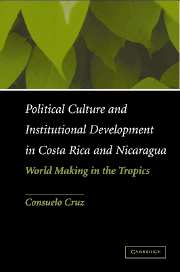 Political Culture and Institutional Development in Costa Rica and Nicaragua
Political Culture and Institutional Development in Costa Rica and Nicaragua Book contents
- Frontmatter
- Contents
- Acknowledgments
- List of Abbreviations
- Chronology
- Political Culture and Institutional Development in Costa Rica and Nicaragua
- Introduction
- 1 Theoretical Overview
- 2 Manichean Identities and Normative Scheming: Origins
- 3 Orphans of Empire: Constructing National Identities
- 4 Postcolonial Paths: Rhetorical Strategies and Frames
- 5 Costa Rica: Possibility Mongers
- 6 Nicaragua: Hybrid Arbitration
- 7 Tropical Histories: Paradise and Hell on Earth
- 8 Transition: Familiar Novelties
- Conclusion
- Index
Introduction
Published online by Cambridge University Press: 20 August 2009
- Frontmatter
- Contents
- Acknowledgments
- List of Abbreviations
- Chronology
- Political Culture and Institutional Development in Costa Rica and Nicaragua
- Introduction
- 1 Theoretical Overview
- 2 Manichean Identities and Normative Scheming: Origins
- 3 Orphans of Empire: Constructing National Identities
- 4 Postcolonial Paths: Rhetorical Strategies and Frames
- 5 Costa Rica: Possibility Mongers
- 6 Nicaragua: Hybrid Arbitration
- 7 Tropical Histories: Paradise and Hell on Earth
- 8 Transition: Familiar Novelties
- Conclusion
- Index
Summary
Culture is often dismissed as no more than the exotic mask of universal rationality. Less often, but with equal certitude, culture is treated as a master force capable of subordinating even the impulse and logic of self-interest. Neither extreme is theoretically or empirically justifiable, especially when dealing with the relationship between politics and culture. This book seeks an analytically sustainable middle ground. In so doing, it heeds calls for an approach to the study of politics that integrates elements of rationalist, structural, and cultural theories. Two broad arguments emerge.
The first is that because politics is about the definition, pursuit, and distribution of justifiable power, polities are at base regimes of encompassing arbitration, and as such they are crucially shaped by political culture. I define a regime of encompassing arbitration as interrelated norms, practices, and processes – formal and informal – for the airing, dismissal, and resolution of momentous public disputes among subjects/citizens and between subjects/citizens and the state. Thus, the allocation of rights to vocality, the assignation of merit and responsibility, the nature of what is public, the willingness of contenders to submit to binding decisions, the regnant standards of fairness, and the mechanisms of enforcement are all features of arbitration regimes. But the emblematic features of such regimes are also their most delicate functions, namely the legitimation of their own authority and, most obviously, the elevation and displacement of arbiters.
- Type
- Chapter
- Information
- Political Culture and Institutional Development in Costa Rica and NicaraguaWorld Making in the Tropics, pp. 1 - 18Publisher: Cambridge University PressPrint publication year: 2005
